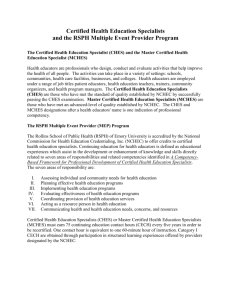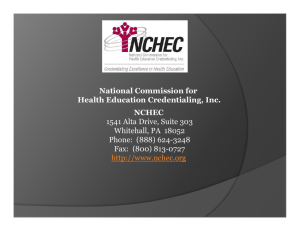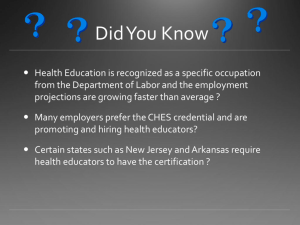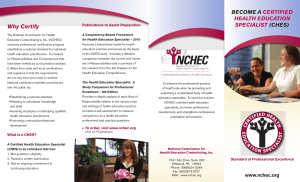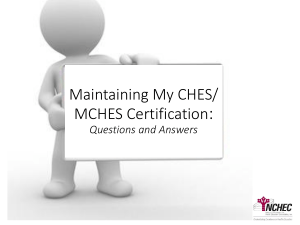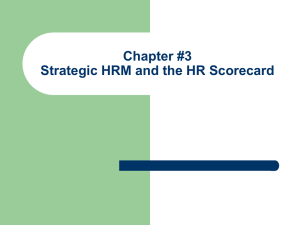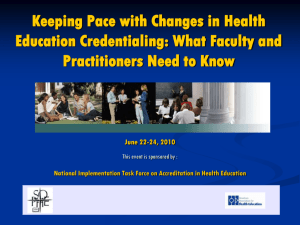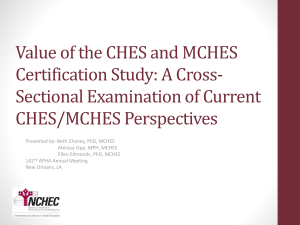Click here or on the image to the presentation
advertisement
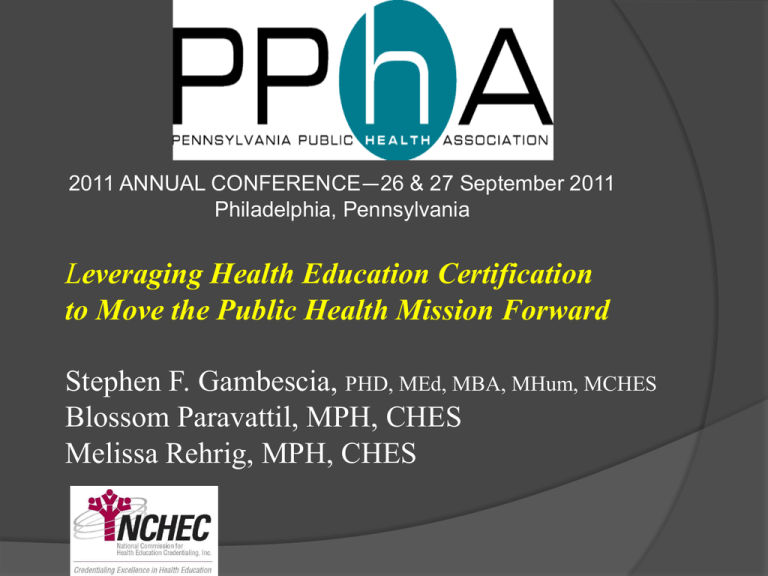
2011 ANNUAL CONFERENCE—26 & 27 September 2011 Philadelphia, Pennsylvania Leveraging Health Education Certification to Move the Public Health Mission Forward Stephen F. Gambescia, PHD, MEd, MBA, MHum, MCHES Blossom Paravattil, MPH, CHES Melissa Rehrig, MPH, CHES Triad of Influences in the Assurance Process of Professional Preparation Programs Accrediting Agency Professional Institution/Program Gambescia, S.F., 2006 Professional Organization Hallmarks of a Mature Profession Consensus on Defined Competencies Certification System for Individuals Code of Ethics Unifying Accreditation Process in Higher Education Increasing Degree Program Offerings (especially at the graduate level) Federal Occupational Classification NCCA Standards for a Professional Credential Conduct role delineation or job analysis Link the examination to a defined body of knowledge Demonstrate the reliability and validity of the examination Develop a minimum passing score Equate alternate forms of the exam Require a method of recertification Source: Institute for Credentialing Excellence (ICE) Formerly known as National Organization for Competency Assurance,(NOCA) Project Partners Professional Examination Service (PES) • Contracted by NCHEC • Standards/best practices: – American Educational Research Association – American Psychological Association – National Council on Measurement in Education Health Educator Job Analysis - HEJA PURPOSE To validate the contemporary practice of entry-level and advanced-level health educators. To re-define core knowledge and competencies for health education practice. Responsibilities, Competencies & Sub-Competencies CUP 2006 HEJA 2010 7 Areas of Responsibility 29 Competencies 163 Sub-competencies 82 Entry 81 Advanced 7 Areas of Responsibility 34 Competencies 223 Subcompetencies 162 Entry 61 Advanced The CHES Examination Examination Specifications based on HEJA-2010 No. Area of Responsibility % I Assess Needs, Assets, and Capacity for Health Education 12% II Plan Health Education 15% III Implement Health Education 24% IV Conduct Evaluation and Research Related to Health Education 15% V Administer and Manage Health Education 11% VI Serve as a Health Education Resource Person 16% VII Communicate and Advocate for Health and Health Education 7% CHES Eligibility Bachelor’s, Master’s, or Doctoral Degree from an accredited institution, AND A major in: health education, community health education, public health education, school health education, OR 25 semester hours (37 quarter hours) specific to course work related to Seven Areas of Responsibility The CHES Exam Competency-based penciland-paper exam 165 multiple-response questions Identifies each Area of Responsibility Offered at over 120 testing locations nationwide Companion Guide available Why an Advanced Credential? Official recommendations of the National Task Force on Accreditation Findings of CUP revealed advanced levels among health educators in their practice. This was confirmed by the Health Educator Job Analysis (HEJA) results. 2006 Feasibility Study Survey: 2/3 of respondents indicated that an advanced level certification will benefit the profession Continuing comments from health educators that current CHES credential is “entry-level” and, therefore, not reflective of the scope of practice of many health education specialists. WHY MCHES? To help advanced-level CHES: identify, promote, and advance their skills. First Cohort of MCHES via the EDO NCHEC implemented the Experience Documentation Opportunity (EDO) process that was offered between October 15, 2010 and April 16, 2011. MCHES EDO applicants documented advanced-level practice in the field of health education and had recommenders attest to their performance and competence levels. A total of 818 Health Education Specialists earned the MCHES designation. This Experience Documentation Opportunity provides unique insight into how the certified health education specialist understands and can apply (via documentation) competencies required in the field. Through this EDO process what can be said of the level of understanding applicants had of our advanced level competencies? What sub competencies are not well understood? What was the level and nature of concern on the description of the advanced activity? What was the level and nature of concern with documentation? Can you use a supervisor/peer reviewer? Upcoming Reports Gambescia, S.F., Paravattil, B., Lysoby, L. & Chaney, E. (27-29 October 2011). Concurrent paper presentation. A snapshot of advanced-level research and practice in health education: Results from the Master Certified Health Education Specialist (MCHES) Experience Documentation Opportunity (EDO). Annual Meeting of the Society for Public Health Education. Washington, DC. Elmore, L. Chaney, E., Gambescia, S.F., Lysoby, L., & Rehrig, M. (1 November 2011). Concurrent paper presentation: A portrait of an advanced-level health education specialist. American Public Health Association Annual Meeting, Washington, DC. Articles in health education journals … MCHES Examination Specifications Examination Specifications based on HEJA-2010 No. Area of Responsibility % I Assess Needs, Assets, and Capacity for Health Education 10% II Plan Health Education 15% III Implement Health Education 20% IV Conduct Evaluation and Research Related to Health Education 16% V Administer and Manage Health Education 16% VI Serve as a Health Education Resource Person 15% VII Communicate and Advocate for Health and Health Education 8% The MCHES Examination 1st offered – October 15, 2011 Style & Structure Provided at the same sites where CHES exam offered 3 hours to complete 165 multiple choice questions; 150 scored, 15 pilot Stand alone & scenario-based multiple choice items Covers all 7 Areas of Responsibility; including 61 advanced-level Sub-competencies Duffy, J. (1991).” Assuring Public Health in A Democracy” in Kevin Cahill (ed.), Imminent Peril: Public health in a declining economy. New York: The Twentieth Century Press, pp 21&22. For More Information 1541 Alta Drive, Suite 303, Whitehall, PA 18052-5642 888-NCHEC4U (624-3248) http://www.nchec.org Brochures Exam Application Revised Framework Study Guide
